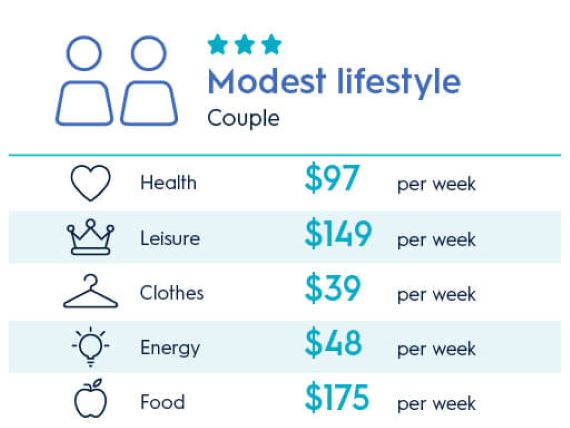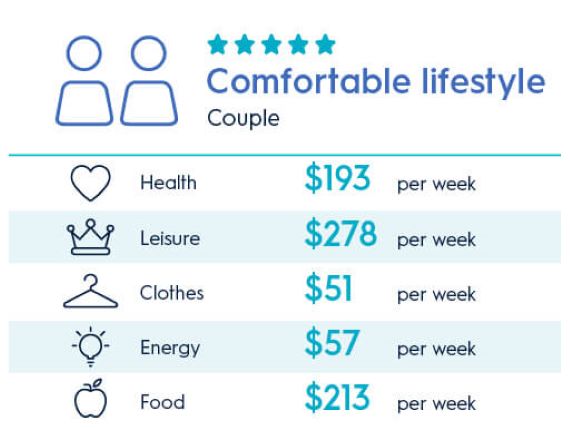A million dollars is a figure that’s often cited as the amount you need to retire. But while $1 million doesn’t go as far as it used to – it only goes slightly above the median house price in Sydney1 – for many people it still sounds like an impossibly large amount of money to save.
In reality, there’s no set figure you need to have accumulated in savings, super, real estate or other investments before you can retire. Instead, the size of the retirement nest egg you’ll need will really be determined by your individual goals and circumstances.

Calculate how much you need to retire
A large part of working out how much money you’ll need to cover your retirement depends on the sort of lifestyle you’d like to enjoy.
The Association of Superannuation Funds of Australia (ASFA) estimates that Australians aged around 65, who own their own home and are in relatively good health, will need the following amount of money each year in retirement, depending on whether they intend to live a modest lifestyle or a comfortable one2:
|
|
Modest lifestyle |
Comfortable lifestyle |
||
|
|
Single |
Couple |
Single |
Couple |
|
Total per year |
$27,902 |
$40,380 |
$43,687 |
$61,909 |
A modest retirement lifestyle is considered better than one solely dependent on the Age Pension but includes only basic activities. A comfortable retirement assumes you’ll be involved in a broad range of leisure and recreational activities, do some travelling, and have a good standard of living.
If you own your own home, another useful measure is that you’ll typically need around two-thirds (67%) of your pre-retirement income to maintain the same standard of living in retirement3.
Calculate your day-to-day expenses
Your current monthly budget is a good place to start when trying to forecast your day-to-day living expenses in retirement, but don’t forget to factor in increases in the cost of living over time.
Some costs may be removed – for example, if you own your home you might be planning to have your mortgage paid off before you retire and perhaps the education costs of any children will also be out of the way by then. Work-related expenses, such as petrol or public transport costs, takeaway lunches, work clothes and dry cleaning will probably also be a thing of the past.
But you’ll still have ongoing costs such as utilities, food, healthcare and insurances to cover, along with the costs associated with owning a car, if you have one. And it’s likely that your spending on recreational activities could also increase once you have the time to enjoy them.
The figures below, taken from the ASFA retirement standard4, give you some indication of the amount of money you might need to budget for each week in various areas.


Your lifestyle
The type of lifestyle you’d like to enjoy in retirement could have a big impact on how much money you’ll need.
Give some thought to the things you like to do now that you may want to do more of in retirement, or any new hobbies you might like to take up, and the expenses involved in doing these.
And if you plan to travel – be it around Australia in a caravan or eventually by plane across the globe – you’ll need to plan for those costs, too.
Check your life expectancy
If you plan to retire at age 65 it’s possible that your retirement savings will need to last you at least 20 years, as life expectancies in Australia continue to increase. Currently men aged 65 can expect to live to 84.9 years, while women can expect to live to 87.6 years.5 There are different living options available in retirement too, so it’s important to think about the long term when considering your financial situation once you stop working.
Check eligibility for government entitlements
Depending on your circumstances, you could be eligible for a part or full age pension payment, which could boost your retirement income.
Other government benefits you may be eligible for include Carer’s Allowance, Disability Support Pension, tax offsets or government loans.
You could also be eligible for a Seniors Card and/or a Pensioner Concession Card, which can help reduce the cost of public transport, some entertainment, healthcare and medications.
And don’t forget that once you hit 60, there’s a number of other benefits you might be able to access.
Options to boost your retirement funds
If you’re concerned you won’t have enough to retire and enjoy the lifestyle you’d like, you could consider working beyond the retirement age, whether full time or part time. Though this can affect access to your superannuation and other government benefits, so it’s important to do your research.
And it’s worth remembering that even beyond retirement your money can continue to grow if you leave your super invested and only draw it down as you need it via a pension, instead of taking it as a lump sum.
Need more help?
If you’re unsure about how much money you’ll need to retire, we can help. Seeking financial advice could also help you determine whether your retirement savings are on track. If you don’t have a financial adviser you can contact us on Ph 02 6282 6282.
1 Core Logic, Hedonic Home Value Index, November 2020.
2 Association of Superannuation Funds of Australia (ASFA), Retirement Standard June 2020.
3 Moneysmart, How much super you need.
4 ASFA, Retirement Standard June 2020.
5 Australian Institute of Health and Welfare, Deaths in Australia, August 2020.
Important: This information is provided by AMP Life Limited. It is general information only and hasn’t taken your circumstances into account. It’s important to consider your particular circumstances and the relevant Product Disclosure Statement or Terms and Conditions, available by calling Ph 02 6282 6282, before deciding what’s right for you.
All information in this article is subject to change without notice. Although the information is from sources considered reliable, AMP and our company do not guarantee that it is accurate or complete. You should not rely upon it and should seek professional advice before making any financial decision. Except where liability under any statute cannot be excluded, AMP and our company do not accept any liability for any resulting loss or damage of the reader or any other person. Any links have been provided for information purposes only and will take you to external websites. Note: Our company does not endorse and is not responsible for the accuracy of the contents/information contained within the linked site(s) accessible from this page.
